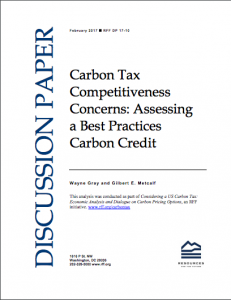Full Title: Carbon Tax Competitiveness Concerns: Assessing a Best Practices Carbon Credit
Author(s): Wayne Gray and Gilbert E. Metcalf
Publisher(s): Resources For the Future
Publication Date: February 1, 2017
Full Text: Download Resource
Description (excerpt):
This paper considers how industry-focused revenue rebating could be used to address competitiveness and leakage concerns arising from a unilaterally imposed carbon tax. Building on previous work, it investigates how firms in specific energy-intensive, trade-exposed (EITE) sectors would fare under various carbon crediting approaches. Specifically, it focuses on the use of output-based carbon credits tied to best practices in the sector and considers its efficiency and administrative characteristics. It also investigates whether firms have sufficient tax appetite to use such a credit. Our analysis shows that there is considerable variation across sectors in average emissions intensity as well as variation in the shape of sector-specific intensity distributions. Establishments that are older, larger, and less productive tend to have higher emission intensities. A “best practices” carbon credit for firms in EITE sectors could provide compensation for firms and mitigate competitiveness issues to some extent. Some firms, however, would not be able to utilize all of their carbon credits due to insufficient tax appetite. The share of unused credits falls with the stringency of the rebate plan. We also compare crediting with deductibility and find the latter has weaker incentive effects for reducing emissions.
